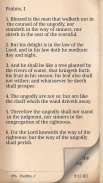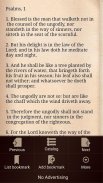




Bible - Psalms

Descrizione di Bible - Psalms
Psalms
The Book of Psalms (Hebrew: תְּהִלִּים or תהילים Tehillim meaning "Praises"), commonly referred to simply as Psalms or "the Psalms", is the first book of the Ketuvim ("Writings"), the third section of the Hebrew Bible. The English title is from the Greek translation, ψαλμοί psalmoi, meaning "instrumental music" and, by extension, "the words accompanying the music." There are 150 psalms in the Jewish and Western Christian tradition (more in the Eastern Christian churches), many of them linked to the name of King David, but his authorship is not accepted by most modern Bible scholars.
Benedictions and superscriptions
The Book of Psalms is divided into five sections, each closing with a doxology (i.e., a benediction) – these divisions were probably introduced by the final editors to imitate the five-fold division of the Torah:
Book 1 (Psalms 1–41)
Book 2 (Psalms 42–72)
Book 3 (Psalms 73–89)
Book 4 (Psalms 90–106)
Book 5 (Psalms 107–150)
Many psalms (116 of the 150) have individual superscriptions (titles), ranging from lengthy comments to a single word. Over a third appear to be musical directions, addressed to the "leader" or "choirmaster," including such statements as "with stringed instruments" and "according to lilies." Others appear to be references to types of musical composition, such as "A psalm" and "Song," or directions regarding the occasion for using the psalm ("On the dedication of the temple," "For the memorial offering," etc.). Some carry the names of individuals, the most common being David, and thirteen of these relate explicitly to incidents in the king's life.
Overview
Individual psalms were originally hymns, to be used on various occasions and at various sacred sites; later, some were anthologised, and might have been understood within the various anthologies (e.g., ps.123 as one of the Psalms of Ascent); finally, individual psalms might be understood within the Psalter as a whole, either narrating the life of David or providing instruction like the Torah. In later Jewish and Christian tradition, the psalms have come to be used as prayers, either individual or communal, as traditional expressions of religious feeling.
Psalms
Il libro dei Salmi (ebraico: תְּהִלִּים o תהילים Tehillim significa "Lodi"), comunemente indicato semplicemente come Salmi o "Salmi", è il primo libro della Ketuvim («Scritti»), la terza sezione della Bibbia ebraica. Il titolo inglese è dalla traduzione greca, psalmoi ψαλμοί, che significa "musica strumentale" e, per estensione, "le parole che accompagnano la musica." Ci sono 150 salmi nella tradizione giudeo-cristiana e occidentale (più nelle chiese cristiane orientali), molti dei quali legato al nome di Re Davide, ma il suo autore non è accettata dalla maggior parte degli studiosi biblici moderni.
Benedizioni e superscriptions
Il libro dei Salmi è suddiviso in cinque sezioni, ognuna chiusura con una dossologia (vale a dire, una benedizione) - queste divisioni sono state probabilmente introdotte dalla redazione finale di imitare la divisione di cinque volte della Torah:
Book 1 (Salmi 1-41)
Book 2 (Salmi 42-72)
Book 3 (Salmi 73-89)
Book 4 (Salmi 90-106)
Book 5 (Salmi 107-150)
Molti salmi (116 di 150) hanno i singoli superscriptions (titoli), che vanno dai commenti lunghi di una sola parola. Più di un terzo sembra essere direzioni musicali, indirizzata al "leader" o "maestro di cappella", tra cui tali dichiarazioni come "con strumenti a corda" e "secondo gigli." Altri sembrano essere i riferimenti a tipi di composizione musicale, come "Salmo" e "Song", o indicazioni riguardanti l'occasione per utilizzare il salmo ("Sulla dedicazione del tempio", "Per l'offerta memoriale", ecc ). Alcuni portano i nomi delle persone, è il più comune David, e tredici di queste riguardano esplicitamente agli incidenti nella vita del re.
Panoramica
Salmi individuali erano originariamente inni, da utilizzare in varie occasioni e in vari luoghi sacri; più tardi, alcuni sono stati anthologised, e potrebbe essere stato capito all'interno delle varie antologie (ad esempio, ps.123 come uno dei Salmi delle ascensioni); infine, i singoli salmi potrebbero essere comprese all'interno del Salterio nel suo complesso, sia narrando la vita di David o di fornire istruzione come la Torah. In seguito la tradizione ebraica e cristiana, i Salmi sono venuto per essere usati come preghiere, individuale o collettivo, come espressioni tradizionali di sentimento religioso.
























